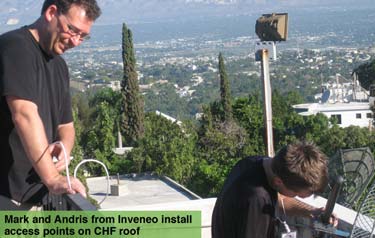
Extending the Network
Just eight days after the earthquake that devastated Haiti in January this year, NetHope had established internet connectivity for its NGO (non-governmental organisation) partners in the Port au Prince area. Now, as increasing numbers of the urban Haitian population migrate outwards from the city, NetHope is focusing on providing high-speed internet connection to NGOs operating in rural areas.

“We are targeting areas in and around Léogâne, Jacmel, Mirebalais, Gonaïves, Cap‐Haïtien and Jérémie for connectivity,” says Frank Schott, Global Program Director for NetHope. “These cities currently lack existing infrastructure to support the needs of newly settled populations.”
“NetHope and our technology partner Inveneo, bring a decade of experience in partnering with local NGOs and internet service providers (ISPs) to set up this type of communications infrastructure so we are uniquely positioned to do this type of work.”
After the earthquake, NetHope and Inveneo restored internet connectivity to 16 of NetHope’s partner NGOs through enabling bandwidth sharing. Long distance WiFi technology given to NetHope by Inveneo, a nonprofit rural connectivity provider, was installed in Port au Prince which enabled the signal from a single hotspot to be transmitted across the ravaged city.
“Inveneo will take best practices from the successful WiFi network in and around Port-au-Prince to rollout communications and IT networks in these additional cities,” said Frank.
The Emergency Telecommunications Cluster (ETC), which was activated in Haiti following the earthquake, assisted NetHope in accessing bandwidth in the country.
“We are now building out a backbone to these regions which will be open to ISPs to use to reach these rural areas,” says Mark Summer, Chief Innovation Officer for Inveneo. “This allows them to offer their services to users they can't reach at this point.”
The networks will be rolled out an 18 month period and are expected to be used by more than 200 NGOs operating in these areas.
“Affordable broadband connectivity is a key enabler for many things,” says Mark. “Better services from the government and NGOs, better education and health care, more opportunities for businesses and local entrepreneurs.”
“Since the network was established shortly after the earthquake, NGOs have seen the value in having more connectivity than they have ever had before,” says Frank. “NGOs are now doing increasingly sophisticated things with the network and this causes them to say ‘Wow, we need even more!’”.